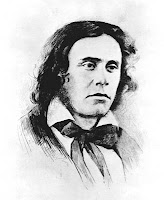I find that people are imagining I have been very industrious this winter, by the way they talk about my new book, which they suppose is something original. I don't want to give wrong impressions in that way, as the selections are more valuable on their own account than mine.
So wrote Lucy Larcom to publisher James T. Fields from Beverly, Massachusetts on May 20, 1866. The book in question was already receiving a little hype, though not yet officially announced. Titled Breathings of the Better Life when published the next year, it was not a book written by Larcom, but edited by her. The book compiled several prose sketches and poems, including several anonymous works and a few traditional hymns. All the selections follow a theme: finding inspiration in saints and Biblical quotes to apply to contemporary life. As Larcom described it, these are "voices that cannot fail to inspire the traveller struggling upward to a better life." Still, she told Fields, "It has been altogether a labor of love with me."
In fact, Larcom wanted to remove herself from the book as much as possible in the hopes of letting the content speak for itself. In her letter to Fields, she asked her name by listed only as "Miss Larcom" — or, better still, even less obtrusively as "L. L." She also emphasized to Fields that the book had to have the lowest cover price possible. Though the final publication did include her full name, the preface in the book carefully ascribed its purpose: an inexpensive book for those who did not have a large library, in a portable size that could be taken to "the workshop, the camp, or the sick-room," and serve like "the presence of a friend." Larcom goes on:
The soul, cramped among the petty vexations of earth, needs to keep its windows constantly open to the invigorating air of large and free ideas: and what thought is so grand as that of an ever-present God, in whom all that is vital in humanity breathes and grows? The want of every human being is a wider expansion to receive from Him, and to give of His; fuller inspirations and outbreathings of that Spirit by which man is created anew in Him, a living soul.
Religion is life inspired by Heavenly Love; and life is something fresh and cheerful and vigorous. To forget self, to keep the heart buoyant with the thought of God, and to pour forth this continual influx of spiritual health heavenward in praise, and earthward in streams of blessing, — this is the essence of human, saintly, and angelic joy; the genuine Christ-life, the one life of the saved, on earth or in heaven.
The book includes both prose and poetry. Few of the listings include the full name of the author, but some are recognizable: Edmund Hamilton Sears, Henry Ward Beecher, and Larcom's friend John Greenleaf Whittier. Ralph Waldo Emerson, a former minister, was represented by this excerpt from his long poem "Threnody":
Wilt thou not ope thy heart to know
What rainbows teach, and sunsets show,—
Voice of earth to earth returned,
Prayers of saints that inly burned, —
Saying, "What is excellent,
As God lives, is permanent;
Hearts are dust, hearts' loves remain;
Heart's love will meet thee again."

























